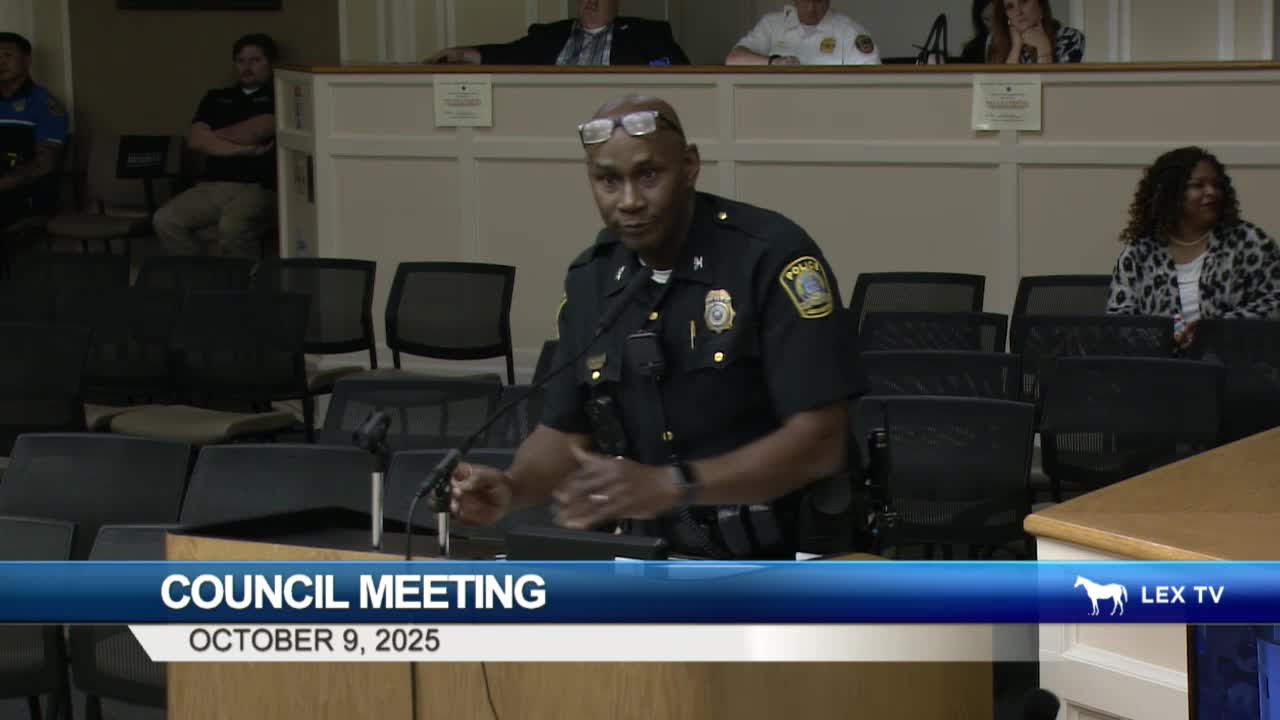Council approves suspensions for one officer, deadlocks on another after bodycam access concerns
Get AI-powered insights, summaries, and transcripts
Subscribe
Summary
The Lexington Fayette Urban County Council on Oct. 9 accepted disciplinary actions for one Lexington Police Department officer after two separate internal investigations and deadlocked on a separate recommended suspension for another officer accused of unauthorized access to body-worn camera footage.
The Lexington Fayette Urban County Council on Oct. 9 accepted disciplinary actions for one Lexington Police Department officer after two separate internal investigations and deadlocked on a separate recommended suspension for another officer accused of unauthorized access to body-worn camera footage.
Council members voted to accept Chief Weathers' recommended discipline for Officer Adam Servacio: a 160-hour (four-week) unpaid suspension tied to a June 30 incident and a 40-hour (one-week) unpaid suspension tied to a July 23 incident. The council did not approve the chief's recommendation for Officer John McFaul, a proposed three-day unpaid suspension for accessing evidence.com footage from an officer-involved shooting without authorization; a roll-call poll produced a tie and the motion failed.
The dispute focused on two issues: whether the proposed punishments matched the misconduct and whether additional training, counseling or technology safeguards are needed to prevent improper access to sensitive footage. Chief Weathers told the council the investigations found some of the allegations against Servacio were substantiated and that Servacio had accepted the 160-hour suspension for the June 30 matter and the 40-hour suspension for the July 23 matter.
"At the conclusion of the investigation, the employee met with me and accepted a four-week suspension, 160 hours without pay," Chief Weathers said, describing the disposition of the first Servacio case. He later said the July 23 review resulted in a one-week suspension without pay.
Council members pressed the chief about consistency and rehabilitation. Council member Morton asked how the department balances corrective action with accountability; Chief Weathers responded the department evaluates each incident individually and may assign outside training or a performance plan when appropriate. "If we determine that this is something we can't correct, I wouldn't be inclined to keep anybody," Weathers said.
Several council members urged counseling or retraining in addition to suspension. Council member Savigny said, "I feel like some of the things that people do are kinda cries for help," and said she was concerned that suspensions alone might not address underlying issues. Council member Reynolds and others asked why the two suspensions for Servacio were different lengths; Weathers said the incidents involved different elements and were evaluated separately.
The McFaul matter drew distinct scrutiny because it involved access to evidence.com. Chief Weathers described the allegation: "By accessing and viewing these videos, Officer McFaul did not adhere to and violated department policy," citing the department's body-worn camera rules. Council members asked whether the department's systems require supervisor approval before an officer can view footage and whether additional technological safeguards are feasible. Weathers said the system logs accesses and that, in many cases, supervisor approval or case-officer authorization is required, but that some footage can be accessible during the download and locking process before it is fully secured.
Council member Morton asked whether technology could prevent unauthorized access; Weathers replied that the current workflow sometimes leaves footage momentarily available while multiple camera files are loading and being locked down, and that technology alone might not fully remove human factors in the short term. Several council members said this possibility undermines public trust in evidence security.
When the council voted on Chief Weathers' recommended three-day suspension for Officer McFaul, the voice vote initially returned "aye," but a subsequent roll-call poll produced a tie and the motion failed. Commissioner Barber, representing the Law Department, advised that if the council does not accept a letter of conformity the officer is entitled to request a hearing under the applicable personnel/collective-bargaining procedures; Barber said the chief could return with a revised letter of conformity to avoid a hearing, but the union may also have a role.
The council's action leaves Servacio's suspensions in place and the McFaul case unresolved at the council level. Council members asked the administration to return with additional information: whether outside counseling or mandatory training had been assigned or completed, whether technical safeguards for body-worn footage access can be strengthened, and whether a different letter of conformity could be negotiated to resolve the McFaul matter without a formal hearing. The chief said the department had already referred Servacio to outside training and counseling recommendations and that additional steps could be taken.
The discussion highlighted broader questions about the department's approach to progressive discipline, the sufficiency of suspensions to change behavior, and the technical and procedural controls around body-worn-camera evidence. Council members warned that failing to address systemic issues could erode public confidence in the police department's handling of sensitive materials.
What happens next: the McFaul recommendation will not take effect after the tie vote; the chief may return with a revised letter of conformity or the matter could proceed to a hearing if the officer requests one under the applicable disciplinary procedures. The council asked the police department and law department to provide follow-up information about training, counseling and technology safeguards.
